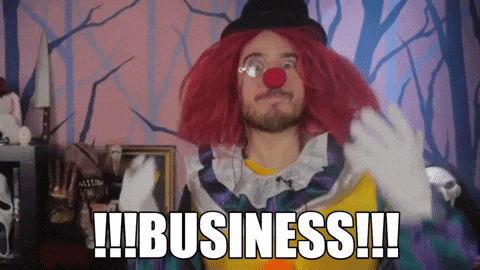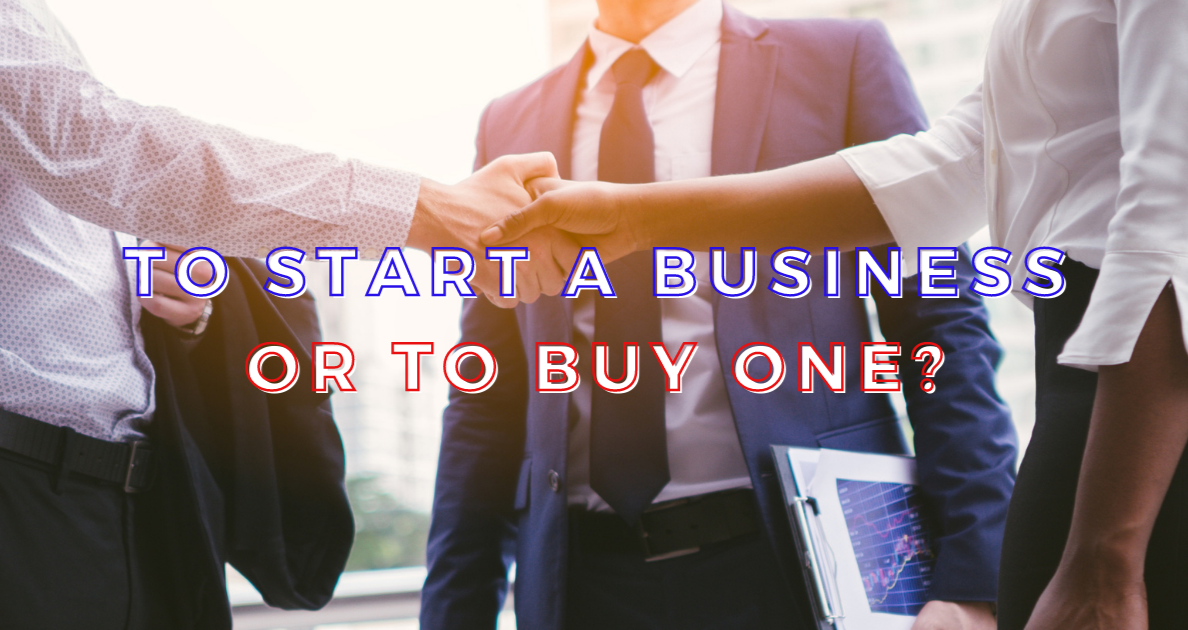Buying a Business vs. Starting a New Business: Which is More Profitable?
Understanding the concept of buying a business and starting a new one
When you think of diving into the world of business, you might picture pitching your unique idea and building your startup from the ground up. This is indeed one approach, you, as an entrepreneur can take. Starting a business involves nurturing your own idea and gradually creating consumer awareness, hiring a team, and establishing a steady cash flow, all without any prior reputation to lean on.
But have you ever considered the alternative? Buying a business is another viable route filled with its perks. In stark contrast to starting fresh, taking over an existing business comes with an established cash flow, a loyal customer base, skilled employees, and tried-and-true systems and procedures in place.
Please note, each option comes with its pros and cons. Let’s delve into these further:
- Starting a Business:
- The thrill of bringing a unique idea to the market.
- The challenge of building a customer base, marketing the business, hiring employees, and establishing cash flow without a track record.
- Potential difficulties with securing financing due to lack of proven track record.
- Buying a Business:
- The advantage of inheriting an already profitable operation.
- Access to an established customer base, experienced employees, and functional procedures.
- Possible higher initial costs, yet often easier to secure financing due to the proven business track record.
- Potential risks such as obsolescent inventory, resistant employees, or outdated distribution methods.
No matter your decision, it’s crucial to gather a supportive team of advisors — your banker, accountant, and attorney, for instance. They can assist with key processes such as “due diligence,” ensuring you understand exactly what you’re getting into, whether you’re unfolding your startup dream or stepping into the shoes of an existing business. With a detailed understanding and careful consideration, you’re better equipped to make a choice that intelligently aligns with your entrepreneurial goals and preferences.

Pros and Cons of Buying a Business
1. Startup Costs
Buying an existing business usually requires a significant initial investment. The price may also be higher if the business is particularly successful or established. Even with financing, the down payment could be sizable.
Starting your own business can be a cost-effective way to launch into the entrepreneurial world. Lower startup costs can provide numerous advantages, especially for first-time business owners. Lower costs allow for a more stress-free entry into the business. You can start with a small investment and gradually increase funding as necessary. A smaller initial financial commitment reduces the need for loans or external financing.
2. Existing Infrastructure and Resources
Buying a business brings with it the ready-made advantage of infrastructure and resources. These existing assets can act as a springboard for prompt operations, but might also have their own baggage, posing unique opportunities and challenges.
Pros:
- Operable right from purchase
- Avoidance of teething problems
- Immediate profits
- Quick and easy finance
- Benefitting from existing brand image.
Cons:
- Hidden faults
- Possible staff discontent
- Outdated or faulty equipment
- Potential of inherited debt
- Resistance to change.
3. Potential for Higher Rate of Return
- You benefit from established brand recognition: no need to invest in initial marketing.
- You’ll have a turnover from day one: speedier profits!
- It’s easier to secure financing: banks love proven business models.
- Your efforts to grow the business offer potentially larger payoffs: growth from a bigger base is more rewarding.
- You inherit efficiencies borne of the original owners’ experience: helping you sidestep costlier beginner’s mistakes.

4. Greater Efficiency and Ease of Operation
Starting a business from scratch can be a thrilling journey, but buying an existing one offers certain advantages like greater efficiency and ease of operation! Let’s explore further why it’s often a savvy move and the potential drawbacks you should be aware of.
Pros:
- You leverage an established brand, relationships, assets, and business processes from the get-go.
- Since the business model is proven, you can start reaping profits quickly.
- Getting financing is more manageable than with a startup.
- You have a trained team in place to maintain the business’s momentum.
Cons:
- You might be bound by the previous owners’ rules, history, and assets.
- The existing customer base might expect products and features that you’d rather not offer.
- Effective change can be more challenging than initially anticipated.
- Freedom to mold the business to your vision could be somewhat restricted.
5. Potential for Greater Market Share
Buying a business comes with an established customer base, granting potential for greater market share. This market presence is a significant advantage, saving valuable time and resources, and giving a headstart over newer competitors.
- You inherit a brand that customers already know and trust.
- Because of the existing customer base and brand loyalty, you can focus more on growth rather than starting from scratch.
- The prior owner has already made key marketing investments that can be reaped by the new owner.
- Incremental growth based on the existing customer base provides larger revenue, offering more financial rewards.
- With existing customers, profits start coming in more quickly than with a startup.
- It’s easier to gain financing due to a proven business model.
For instance, buying a popular local bookstore will give you immediate access to its loyal customers, potentially enhancing your market share. However, always research the market landscape and competition before investing.
6. Access to Existing Brand and Customer Base
Stepping into an established business is like walking down a path already lit. The perks of an existing customer base and brand recognition can pave the way to a successful entrepreneurial journey.
Every entrepreneur dreams of immediate cash flow – buying a running business makes this a reality. The built-in customer base hastens sales, inducing positive cash flow from day one.
Tweaking an existing business is much more manageable than constructing one from scratch. Here’s why:
- Brand recognition saves time and costs, accelerating business growth.
- An established customer loyalty spells lesser marketing expenditure.
- Accessibility to proven business processes eases the learning curve.
- The struggle of creating a market presence disappears, boosting financial prospects.
- Assurance of a steady revenue stream gives freedom for improvements.
With this strategy, you’re not just buying a brand, you’re acquiring an eye towards profit-making opportunities.
7. Increased Financial Security
- When you buy a business, you’re paying for proven success. This gives you the advantage of immediate profitability, negating the tough start-up phase.
- It isn’t just you who trust a proven business model: Lenders do, too. Banks are generally more inclined to support an established business, reflecting on crucial data; Start-ups often face loan denial.
- An established business comes with tangible and intangible assets. These could range from real estate and machinery to customer relationships and brand image, setting you up for long-term security.
- The future is more predictable with an established business. With operational history and steady revenue, you can better project your financials.
Conclusively, buying a business might require a larger budget upfront, but the financial stability it offers can be worth the investment.

Pros and Cons of Starting a New Business
1. The advantage of starting a new business is that you do not have to deal with the headache of an existing business.
- Your creative reign: With a brand new venture, you’re free to design and run your business as you envision, breaking traditional rules if you choose.
- Innovation at its peak: You have the opportunity to bring forth something new to the market, a unique idea that’s wholly yours.
- Lower costs: Launching a new business could be less expensive than acquiring a successful existing one.
- Exclusive decision-making authority: All decisions and their outcomes are in your hand, giving you complete control over the direction and growth of your business.
2. A new business has the potential to grow faster due to the lack of established procedures and systems.
Starting from scratch offers an exciting possibility – the chance to grow a business faster due to the absence of established procedures and systems. Free from the bind of old ways, you can innovate swiftly.
- The lack of legacy systems enables quick adaptation to dynamic market trends.
- Freedom to design, your start-up can move faster as it isn’t restrained by past rules, history, or assets.
- By not requiring adherence to past methodologies, newcomers can more readily embrace new technologies and innovative ventures.
3. A new business has the potential to be more profitable, as there are no existing overhead costs.
Starting a new business could potentially yield higher profits than buying an existing one, largely because you aren’t inheriting overhead costs. You can design and manage your business as per your vision, without being bound by any existing processes or assets.
4. A new business has the opportunity to develop its own unique brand, which may not be the case for an already established business.
Launching a new business can be an exhilarating experience with an unparalleled opportunity to create your own unique brand. As an entrepreneur, you’re entering virgin territory – a fresh canvas awaiting your innovative touches.
Creating a brand from scratch isn’t for the faint-hearted. It comes with challenges, but these struggles foster stronger brands. You’ll stand out, learn invaluable lessons and understand the marketplace better.
5. A new business has the potential to have better access to resources and capital.
Starting your own enterprise offers optimism of better control over resources and capital allocation. As you maneuver through different business environments, you’ll find the journey potentially more rewarding and productive.
Argument: A brand-new venture provides freedom to tailor the business according to your ideals and available resources. Moreover, from the onset, you are in command, shaping the business’s strategic direction while innovating along the way.
6. A new business has the potential to be more successful due to the lack of competition.
- No legacy constraints: Begin afresh, without being bound by existing assets, dated methods, or obsolete technologies. You steer the ship.
- Competition-free growth: Absence of competition can mean unparalleled growth. Let your business have the first-mover advantage and capture unexplored markets.
In all, a new business can provide a playground for your innovative ideas, potentially leading to successful conquests, with reduced competition.

7. A new business has the potential to be more profitable because it does not have to deal with the previous owner’s mistakes.
Starting a fresh business can yield high profits and avoid falling into the pitfalls and errors of the past. This uncoupled route to entrepreneurship allows you to pave your own way without having to repair past mistakes.
Pros:
- The possibilities for innovation and creativity are endless.
- It costs less than buying an already successful business.
- You have full control to design and manage the business according to your vision.
- Startup has lower financial risk for lenders, hence acquiring finances is easier.
- Unlike existing businesses with preset targets, startups can set their own successive goals.
Cons:
- Startup requires a lot of time dedicated to building a customer base from scratch.
- Unlike established businesses, startups jump into the unknown in regard to financial security.
- Potential difficulty in spreading the word about your new business.
- It might take longer to start generating profit.
- Necessity to establish a brand, and develop customer relationships, business processes, and assets from the ground up.
Which is More Profitable? Buying a Business or Starting a New Business
The decision between buying an existing business or starting a new one can be influenced by several factors. It’s important to consider all aspects, such as the upfront cost, availability of capital, risk tolerance, and entrepreneurial spirit before making a decision.
- A significant advantage of buying an established business is the immediate cash flow. According to the analysis provided by Rose Hill, an online journalist for Businesses For Sale, existing businesses are often already generating profits. This allows new owners to focus more on growth and less on the initial survival of the business.
- Starting a new business, on the other hand, demands patience as profits won’t materialize immediately. Entrepreneurs must invest considerable funds initially, without seeing any significant return on their investment for a potentially long period. This requires tenacity and risk tolerance.
- The availability of capital is an essential factor when considering whether to start or buy a business. Starting a new business may allow more flexible use of capital, as it can be adjusted according to the entrepreneur’s budget. However, buying a business tends to be more costly upfront, although it can arguably offer a quicker return on investment due to existing cash flow.
- One crucial point to consider is that financing an existing business is often easier than funding a startup. Lenders and investors are more likely to back a business that has already proven its viability and profitability. This can be a critical factor when weighing up the options.
- Lastly, personality traits and the entrepreneur’s unique circumstances play a vital role in this decision. Not everyone is up for the uncertainty and grueling beginnings of a startup. For some, stepping into a business that’s already stable and profitable may suit their circumstances and personality traits better.
Data-driven conclusion, on profitability alone, would lean towards buying an established business due to the already flowing cash stream and the ease of securing additional financing if needed. However, personal circumstances, risk tolerance, and entrepreneurial desires are crucial considerations that play into this decision. Therefore, while it may be more monetarily profitable to purchase an existing business, the intangible gains from starting a business from scratch may be more rewarding for certain individuals.

Conclusion: Which is a better option for you?
Choosing to buy an existing business or start a new one is a monumental decision that’s dependent on numerous factors. Having weighed the pros and cons, it’s clear both options present a unique set of challenges and opportunities.
- Firstly, purchasing a business offers a more secure footing with its established client base and brand, yet it requires ample knowledge about its existing framework.
- Secondly, starting a business brings forth the freedom of control and the excitement of pioneering, though it captures higher risks with unforeseen hurdles.
- Lastly, consider your financial capacity, your skills, lifestyle, and the full landscape of the chosen industry to determine the most suitable path for you.
In essence, the final verdict relies upon thorough due diligence, your personal circumstances, and your business aspirations. Remember, no choice is universally right or wrong, only what fits best with your own business goals and risk tolerance.
- E-Commerce Testing: The Ultimate Guide to Testing E-Commerce Websites - June 19, 2022
- Everything You Need To Prepare When Starting An Online Retail Business - January 30, 2022
- A Guide To Buying an Online Business: Tips For Beginners - October 7, 2021







